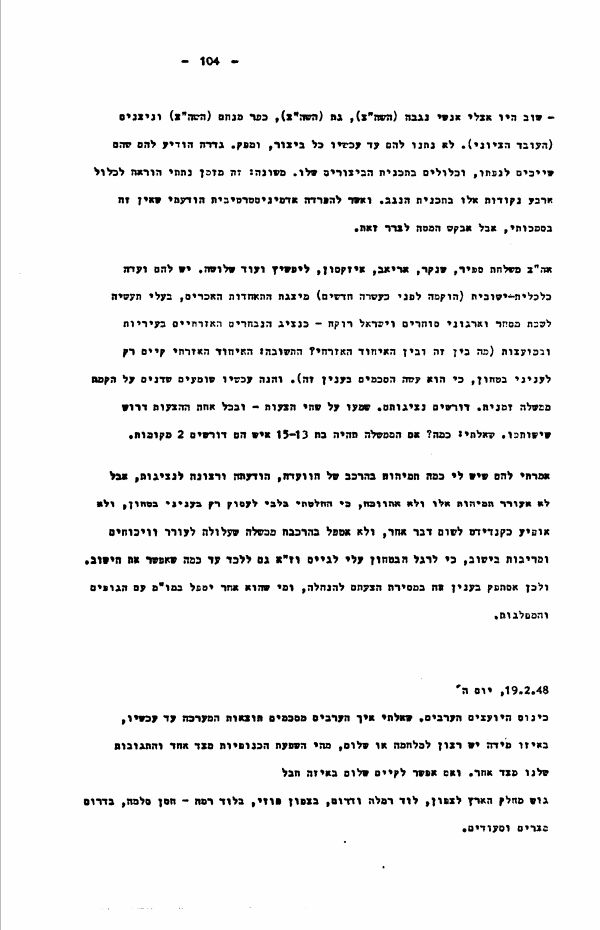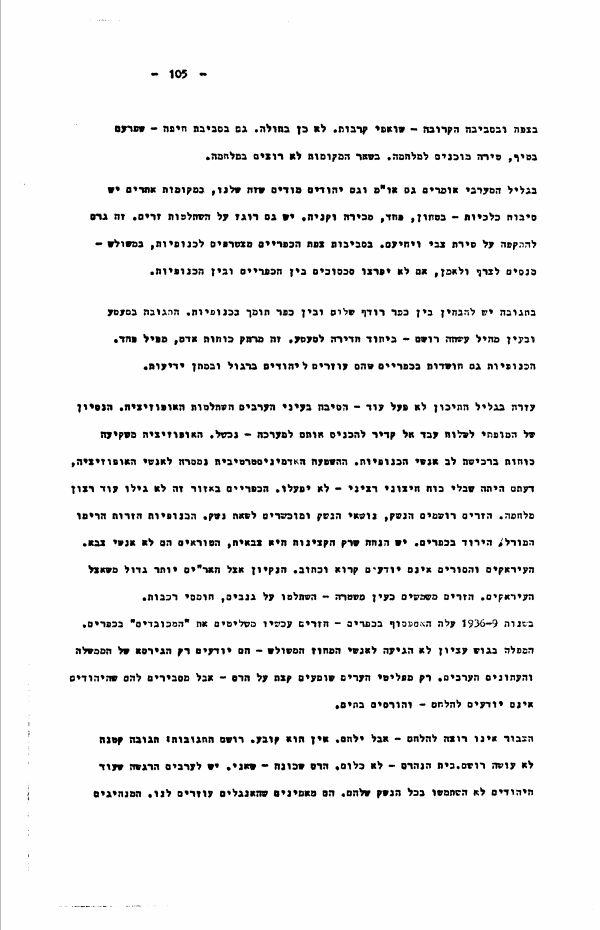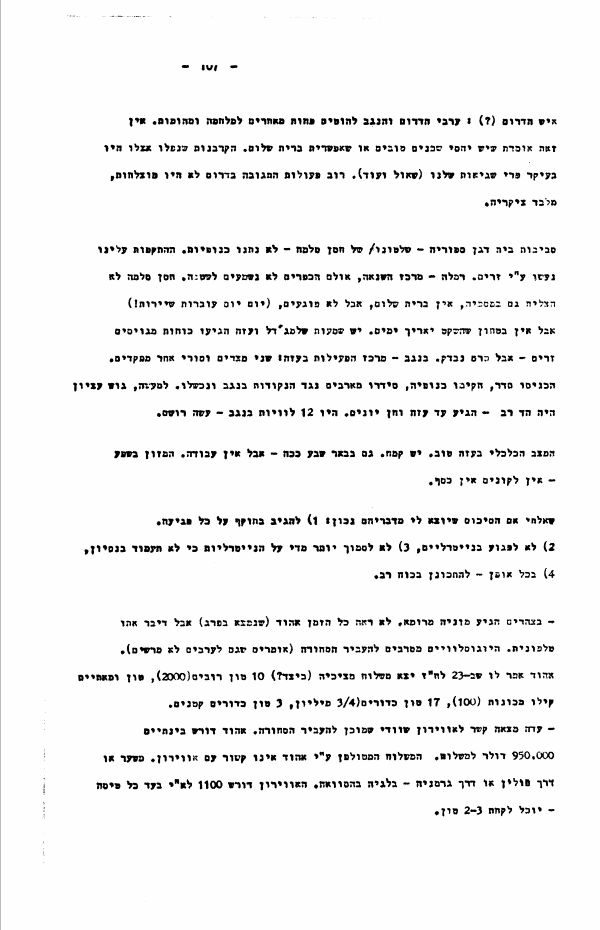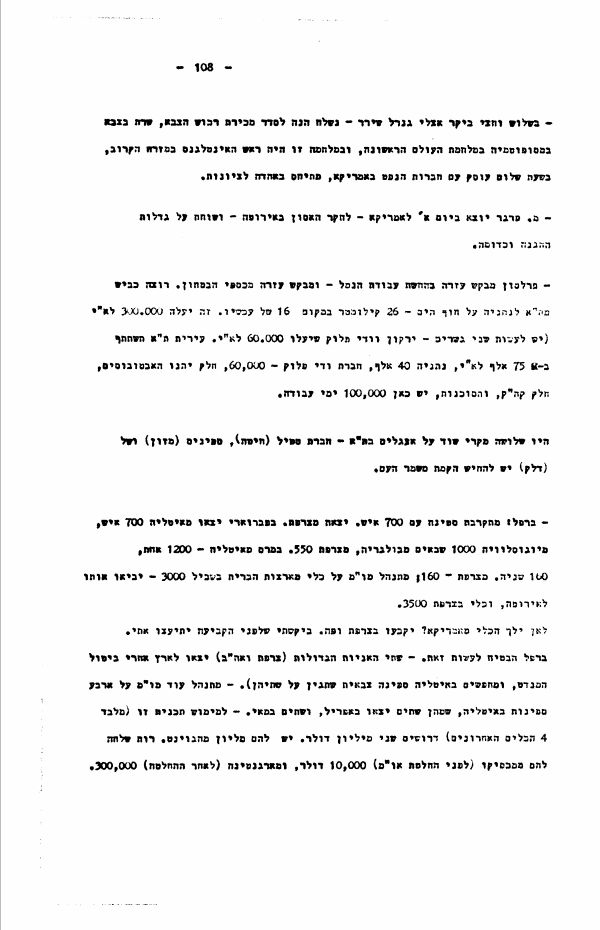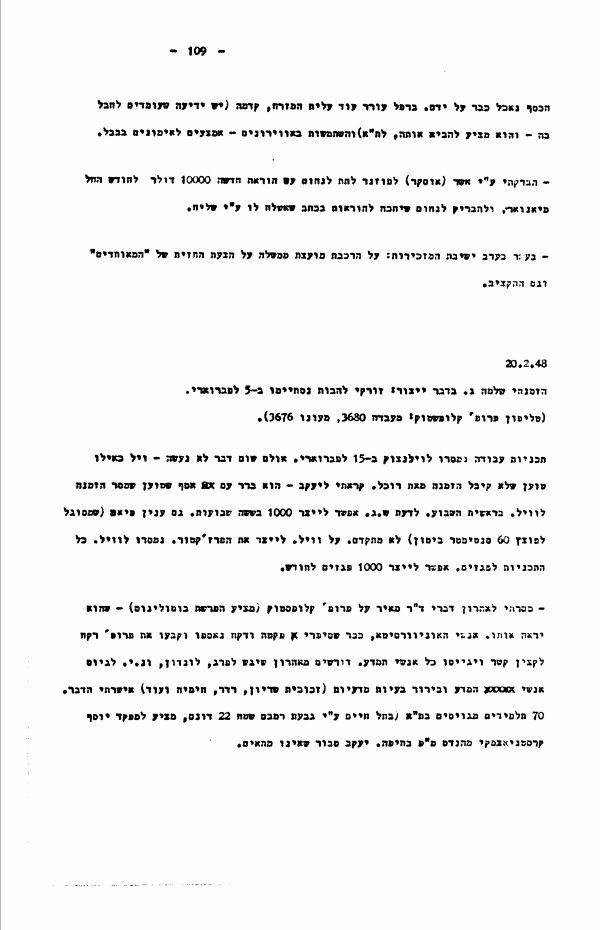Thursday, February 19, 1948
Convening of Arab advisors. I asked how the Arabs summarize the outcomes of the warfighting so far. To what extent [do the Arabs] want war or peace; what's the impact of the gains on the one hand and of our responses on the other. And can peace be maintained in some region.
Josh [Palmon] divides the country into the north, Lod-Ramle, and the south. In the north are Fawzi [al-Qawuqji]'s men; in Lod-Ramle - Hasan Salameh[''s men]; in the south - Egyptians and Saudis.
In Safed and the nearby surroundings - they want war. Not so in the Huleh. Likewise around Haifa - Shfar'am, Batuf [Bet Netofa Valley] - Tira, they're ready for war. Elsewhere they don't want war.
In the Western Galilee [the Arabs] say: Both the UN and the Jews admit that this is ours. In other areas there are economic reasons - security, fear, sales and purchases. There's also anger over foreigners taking over. This led to the attack on Tirat Zvi and Yehiam. Around Safed the villagers are joining gangs; in the Triangle - they're trying to recruit and train [men], as long as clashes don't erupt between the villagers and the gangs.
In [our] response [actions] it's necessary to differentiate between a peace-seeking village and a village that supports gangs. The response in Sa'sa' and ''Ein Mahel made an impression - especially the invasion of Sa'sa'. It pins down manpower, instills fear. The gangs also suspect the villagers of helping Jews by spying and providing information.
Ezra [Danin]: The [Arab] Central Galilee [opposite the Sharon and Samaria settlements] hasn't taken further action. The reason, in the Arabs' view - the opposition's dominance. The Mufti's attempt to send Abd al-Qadir to mobilize them to fight - failed. The opposition is investing effort in winning over the hearts of gang members. The administrative influence has shifted to opposition members; their [the oppositionists'] view was that without a serious external force - they won't act. The villagers in this area haven't yet demonstrated a desire for war. The foreigners are documenting weapons, weapons bearers, and those trained to bear weapons. The foreign gangs have raised the low morale in the villages. There's an assumption that only the [officers' echelon] is military, that the new recruits are not military men. The Iraqis and the Syrians do not know how to read or write. Cleanliness among the locals is greater than among the Iraqis. The foreigners serve as a police of sorts - they've gained control over thieves, train robbers. During 1936-39 [the Arab riots] the rabble in the villages increased. Now the foreigners are imposing rule by the "dignitaries" in the villages. The [Arab] defeat in Gush Etsiyyon hasn't reached the people of the Triangle - they only know the version of the government and Arab newspapers. It's only from those who've escaped the cities that they hear a little bit about the destruction, but they tell them that the Jews don't know how to fight - and [instead] demolish houses.
The public does not want to fight - but will fight. It does not decide.
The impression [left by our] responses: A small-scale response doesn't make an impression. A demolished home - is nothing. Demolition of a neighborhood - that's different. The Arabs feel that the Jews have not yet used all their weapons. They believe that the English are helping us. The leaders of course know that the English support them - but the masses don't [know this]. It's doubtful that an area of peace can be established - but if we differentiate [in our responses] between those who've been compelled and those who want war - [this] will yield results. Some Arabs are starting to gather in the shadow of those Arabs who are known as friends of the Jews.
Is there a possibility that they will forcefully rise up against the foreigners? - No. There's no reason to do so. [The foreigners] do not bother or oppress [them]. On the contrary, they instill order. There's fear of the Jewish response. Sa'sa' made an impression. When there's a rumor about Jewish attacks - [people] flee. They believe that the Arab "army" will be able to operate successfully after the British withdrawal. The leaders say that the Gush Etsiyyon incident wasn't [their] initiative, nor even Tirat Zvi.
Yigael [Yadin] asked: Is it possible that the attack on Tirat Zvi occurred without the "commander" [Qawuqji] knowing? Josh replied that his contact in Damascus heard that the gang members reported to Fawzi [al-Qawuqji] that the Jewish settlements were destroyed, 200 Jews killed, 300 wounded, and a third [settlement] was spared only because they opened water containers. Moshe Dayan added that he personally heard a telephone call from Jenin to Egypt with the same story. The Galilee advisor, Tuvia [Lishansky], concluded that the operation in Tirat Zvi was properly planned on the basis of earlier reconnaissance missions (with the assistance of the Arab district officer) and participation by residents (participants came from Bet She'an). Two companies took part in the operation, one using French weapons, and one - English, and they didn't intermix. After the incident [our people] heard conversations among the officers discussing how to report on the battle to Damascus and Egypt (200 Jews killed, etc.) and also how to cover for their men and themselves - because the rain interfered, etc.
In the Western Galilee there's no interest in fighting. The Druze do not want to fight but will assist the gangs. The outer villages are afraid. They shoot a lot and have a lot of people on guard duty.
There's a lot of movement along the Acre-Beirut road - in both directions.
Some Arabs are advising us [to engage in] harassment: It's frightening, wastes ammunition, pins down forces. The Metualim [Shiite Muslims in the north] have no interest in war; they're across the border and do not particularly like the Sunnis.
Giora [Zaid] reports: The Druze in the Carmel villages and Shfar'am aren't assisting the gangs. In addition, there are grievances and suspicion between the Syrians and the villagers.
The southerner [southern advisor, David Karon]: The Arabs of the south and the Negev are less enthusiastic than others about war and rioting. This doesn't mean that there are good neighborly relations or the possibility of a peace alliance [with the Jews]. The victims who died on our side resulted primarily from our mistakes (Shu'ot and others). Most of the response actions in the south were not successful, aside from Sukhrir.
Around Bet Dagan - Saffuriya [today - Tzipori] - [an area] controlled by Hasan Salameh - gangs haven't [taken action]. The attacks against us were carried out by foreigners. Ramle is the center of hatred, but the villages aren't responding to the incitement. Hasan Salameh also wasn't successful in Masmiyya [today - Ram Junction]. There's no peace alliance, but neither are they launching strikes (convoys pass through on a daily basis), but there's no guarantee that the state of calm will last. There are rumors that foreign enlisted forces have reached Majdal [today - Migdal Ashkelon] and Gaza - but these haven't been confirmed yet.
In the Negev - the center of activities is in Gaza: Two Egyptians and a Syrian are in command. They've instituted order, established a gang, organized ambushes against the Negev settlements and failed. The Gush Etsiyyon incident had a tremendous echo - as far as Gaza and Khan Yunis. There were 12 [Arab] funerals in the Negev - [this] made an impression.
The economic situation in Gaza is good. There's flour. So too in Beersheva - but there's no work. Plenty of food; the buyers have no money.
I asked whether my summary of their remarks is correct: 1) Respond forcefully to every strike. 2) Don't hurt neutrals. 3) Don't rely too much on neutrality because it won't last if tested. 4) In any event - to prepare with great force.
- In the afternoon Munya [Mardor] arrived from Rome. The whole time [he was there] he didn't see Ehud [Avriel] (who was in Prague), but he spoke with him by phone. The Yugoslavs are refusing to transfer the merchandise [weapons] (they say they're not allowing this for the Arabs either). Ehud says that on the 23rd of this month a shipment will leave Czechoslovakia (how?) - 10 tons of rifles (2,000), a ton and two hundred kilos [heavy] machine [guns] (100), 17 tons of rounds (3/4 million), three tons of small bullets.
Ada [Sereni] found a contact for a Swedish airplane [pilot] who's willing to transport the merchandise. In the meantime Ehud is demanding $ 950,000 [to purchase] a shipment. The shipment telephoned [discussed by phone] by Ehud is not related to the airplane. [Munya] surmises - either via Poland or via Germany-Belgium under camouflage. The airplane requires P£ 1,100 for each flight - can take 2-3 tons.
- At 3:30 General Shearer [sp.] visited me - [he was] sent here to arrange the sale of army property. He served in the army in Mesopotamia [Iraq] during World War I, and during this war was head of intelligence in the Near East. In peacetime he works with oil companies in America. He's sympathetic towards Zionism.
- M. [Moshe] Prager [Agudas Israel] leaves on Sunday for America - to investigate the catastrophe in Europe - and spoke about how great the Haganah is.
- Perlson [Eliezer Peri] seeks help in expediting work on the port [in Tel Aviv] - and seeks help from the defense funds. He wants a road from Tel Aviv to Netanya along the coastline - 26 kilometers instead of the current 46. This will cost P£ 300,000 (two bridges have to be created, over the Yarkon and [over] Wadi Faliq [Poleg Stream] - which will cost P£ 60,000). The Tel Aviv municipality will contribute P£ 75,000, Netanya 40,000, the Wadi Faliq company - 60,000. Some will be provided by the bus [companies], some by the KKL and the Agency. There are 100,000 workdays here.
There were three incidents of theft from the English in Tel Aviv - from Steel [Brothers Ltd.], Spinneys (food), and Shell [Corporation] (fuel). The formation of the People's Guard should be expedited.
- [Yosef] Barfel [Kadmon, from the Mossad le-''Aliya Bet]: A ship with 700 people is approaching. It departed from France; in February 700 people departed Italy; 1,000 from Bulgaria are coming [via] Yugoslavia [the ship Bonim VeLohamim]; from France 550. In March from Italy one [ship with] 1,200, a second [with] 160; from France - 160. Negotiations are underway over a vessel [ship] from the United States for 3,000 - they'll bring it to Europe, and a vessel in France, 3,500.
Where will the vessel from America go? - They'll decide in France and here. I asked that they consult with me before reaching a decision. Barfel promised to do so.
The two large ships (France and the US) will depart for the country after termination of the Mandate; there's a search underway in Italy for a military ship to defend them both. There's another negotiation underway over four ships in Italy, of which two will depart in April, and two in May.
Implementing this plan (excluding the last four vessels) requires $ 2 million. They have a million from the Joint. Ruth [Aliav] sent them $ 10,000 from Mexico (before the UN resolution), and 300,000 from Argentina (after the resolution).
They've already eaten up the money.
Barfel also raised the question of Eastern immigration on the Kedma (there's a report that it's about to be sabotaged - and he suggests bringing it to Tel Aviv) and the use of airplanes [to transport immigrants from Eastern countries].
[We discussed] the means for training in Babylon [Iraq].
Through Asher ["Oscar" - Shalom Ron of the Mossad le-''Aliya Bet] I cabled Pozner [telling him] to give Nahum [Shadmi] $ 10,000 per month beginning in January, until notified otherwise, and to cable Nahum to wait for written instructions that I'll send him by messenger.
- At 10 p.m. a meeting of the [Mapai] Secretariat: on the composition of the Government Council, the "united" proposal for a front, and also the budget.





